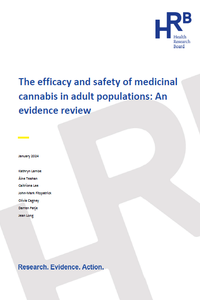Published: 23 January 2024
The efficacy and safety of medicinal cannabis in adult populations: An evidence review
The Medical Cannabis Access Programme in Ireland currently provides access to cannabis to patients with one of three conditions when other treatments have not been successful. The three conditions are spasticity (stiff and/or rigid muscles) associated with multiple sclerosis, nausea and vomiting associated with chemotherapy, and severe epilepsy.
This evidence review was conducted to inform a Department of Health review of the current Medicinal Cannabis Access Programme on the suitability of cannabis-based products for medical conditions. We found evidence to support the use of prescribed medicinal cannabis for certain conditions for which it is currently approved in Ireland, such as nausea and vomiting in cancer and spasticity in multiple sclerosis. There was also evidence of a significant benefit for neuropathic or nerve pain, which can occur with conditions such as multiple sclerosis, diabetes or spinal cord injury.
For most other conditions, including anxiety and pain in conditions such as cancer, rheumatic diseases and fibromyalgia, there is no conclusive evidence to confirm the efficacy of prescribed medicinal cannabis.
Regarding the safety of prescribed medicinal cannabis, the review found that although serious adverse events do not appear to be common, there is some evidence that some side effects such as dizziness, dry mouth, sedation, and headache can occur. Mixed evidence was found, however, on the likelihood of other adverse events such as drowsiness, nausea, and any psychiatric disorder adverse events. Our findings are similar to those reported by other overviews.
This review was an overview of reviews. While traditional systematic reviews gather evidence from existing original research studies (primary studies), an overview of reviews gathers evidence from existing systematic reviews. We focused on systematic reviews of studies of adults who received prescribed medicinal cannabis containing natural or synthetic cannabidiol (CBD) or tetrahydrocannabinol (THC) or their derivatives, and excluded evidence on cannabis for recreational use or for medicinal use without prescription/medical supervision.
The 47 included systematic reviews covered research from the last 30+ years on a wide range of medical conditions, including cancer, multiple sclerosis, rheumatic diseases, chronic pain, and mental health and neuropsychological conditions. The evidence review revealed a fragmented body of research – many types of medicinal cannabis exist, making it difficult to gather a strong body of evidence for one particular formulation for a given condition or complaint. Further high-quality research is needed based on randomised controlled trials. In the meantime, this review will help inform decision making in relation to future policy on the use of prescribed medicinal cannabis along with input from patient groups, clinicians, and service planners.

